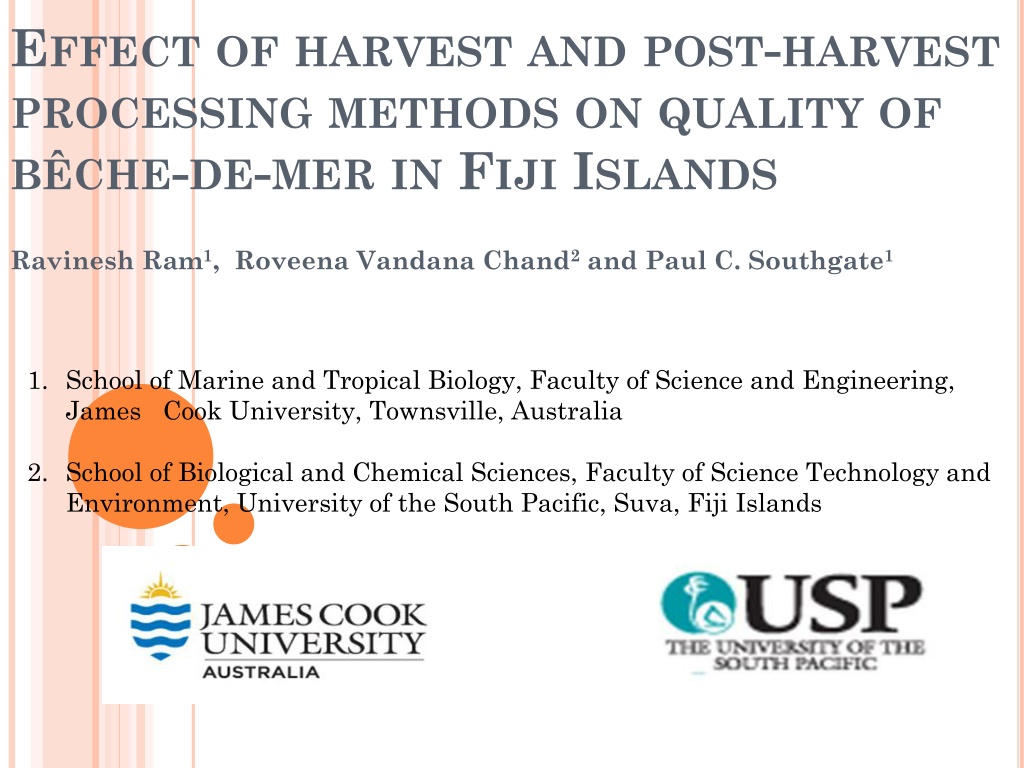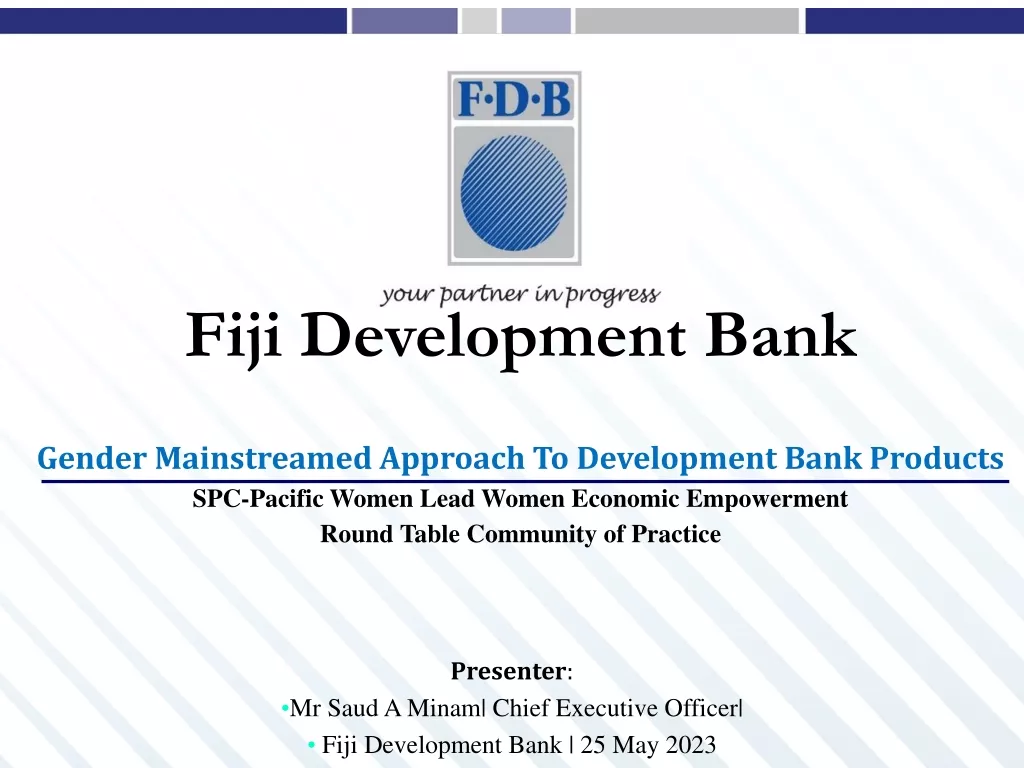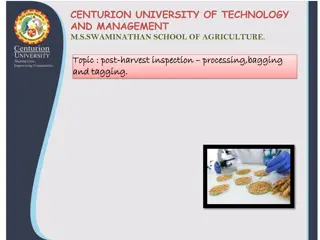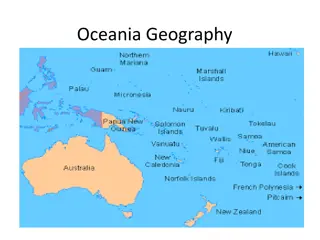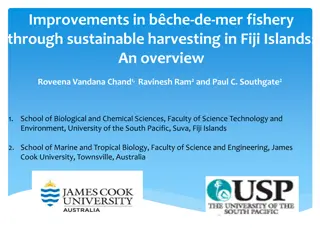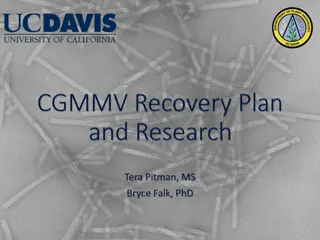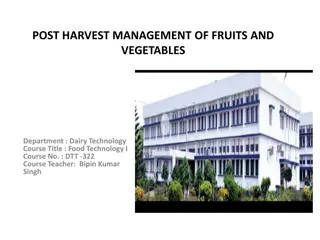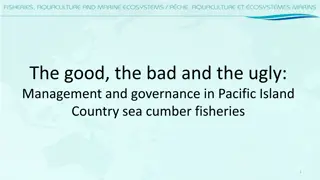Impact of Harvest and Post-Harvest Processing on Sea Cucumber Quality in Fiji Islands
Sea cucumbers, a valuable delicacy in Asian cuisine, have been harvested in Fiji for centuries due to their rich nutritional profile and health benefits. This study investigates the effects of different harvest and post-harvest processing methods on the quality of bche-de-mer, a dried form of sea cucumber. Data collected from fishers, middlepersons, and exporters were analyzed using statistical software. Various processing techniques, including boiling, drying, cutting, gutting, and smoke drying, were assessed for their impact on the final product. The study provides insights into optimizing sea cucumber processing in Fiji to maintain quality standards.
Download Presentation

Please find below an Image/Link to download the presentation.
The content on the website is provided AS IS for your information and personal use only. It may not be sold, licensed, or shared on other websites without obtaining consent from the author. Download presentation by click this link. If you encounter any issues during the download, it is possible that the publisher has removed the file from their server.
E N D
Presentation Transcript
EFFECT OF HARVEST AND POST-HARVEST PROCESSING METHODS ON QUALITY OF B CHE-DE-MER IN FIJI ISLANDS Ravinesh Ram1, Roveena Vandana Chand2and Paul C. Southgate1 1. School of Marine and Tropical Biology, Faculty of Science and Engineering, James Cook University, Townsville, Australia 2. School of Biological and Chemical Sciences, Faculty of Science Technology and Environment, University of the South Pacific, Suva, Fiji Islands
Introduction Sea cucumber a delicacy for Asians Harvested in Fiji for over 2 centuries Sea cucumbers are nutritionally rich in protein (43%), minerals (21%), fatty acids (5-61%). Has a number of health benefits and serve as a tonic and traditional remedy for hypertension, asthma, rheumatism, cuts and burns, impotence and constipations. Sea cucumber in perishable state processed to a dry form known as b che-de-mer. Simple processing boiling and drying stages
Location of study site Location of study site Source: http://www.taveunidive.com/sg_userfiles/world_according_to_Fiji_Map.png
Data collected through formal and informal interviews with the fishers (n=86), middleperson (n=8), and the b che-de-mer exporters (n=5) (Chinese nationals). Data analysed using SPSS statistical software by the method of Logistic regression and Hosmer and Lemeshow test.
Sea cucumber processing technique used in Fiji Islands
first cook, cutting and gutting, smoke drying (P < 0.04; P < 0.05)
Collagen stain dry salting process 36 hours 24 hours 72 hours 48 hours Picrogomori stain
Holothuria hermanni (Curry fish) Stichopus Chloloronotos (Green fish)
Implications Improving the processing techniques will help the fishers of the Pacific to process better yield. Processing manuals be designed for individual species and distributed to fishers and processors conversed in vernacular languages (currently underway) Workshops/training and awareness be raised on sea cucumber harvesting and processing
Sea cucumber processing technique in Fiji is used from the 1800 s Processed by series of boiling and drying process First boil, cut and gut and smoke drying were difficult steps in processing technique identified by the processors Follow up study in progress ( Impacts of processing techniques on quality and nutritional composition of tropical sea cucumbers - JCU)
References SPC, Sea cucumbers and beche-de-mer of the tropical pacific. Handbook No. 18. 1994, Noumea: SPC. 51. Seeto, J., B che-de-mer processing a little more effort to get much more money while saving precious resources. SPC B che-de-mer information bulletin, 1999. 11: p. 2-3. Sachithananthan, K., et al., Report on the national workshop on fish handling in Zanzibar, in United Republic of Tanzania and report on the Tanzania/ SWIOP national workshop on B che-de-mer processing. 1985, National workshop on fish handling. p. 45-83.
Thank you Source: https://i.chzbgr.com/maxW500/5895416832/h88F92155/
